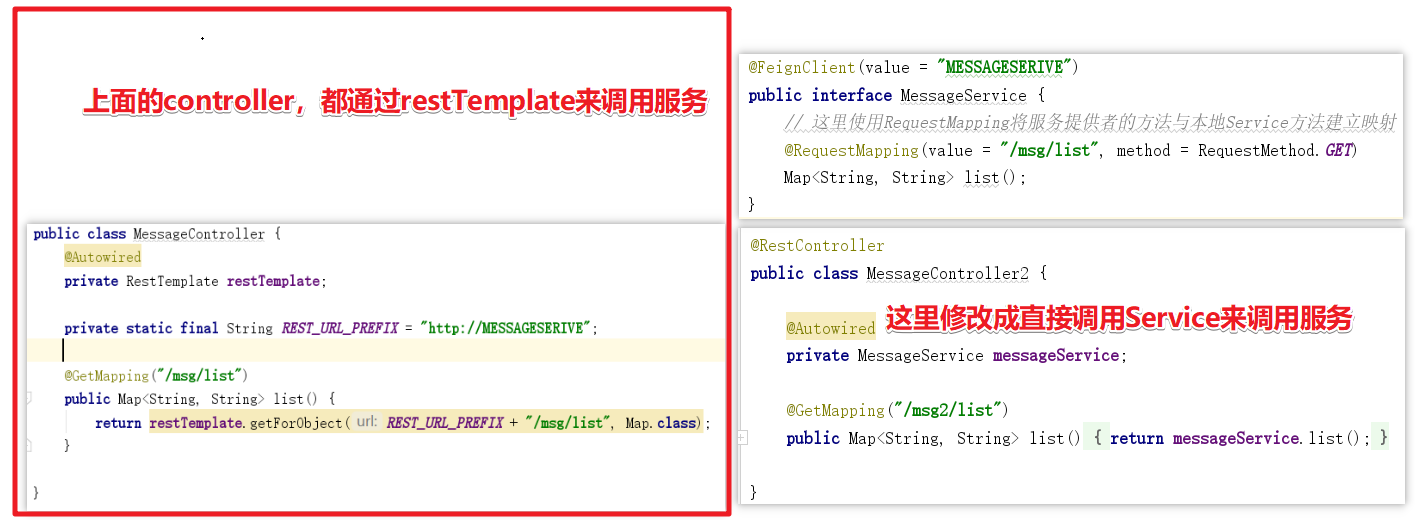Spring Cloud认知学习(三):声明式调用Feign的使用
💡上一篇介绍微服务构建起来后,使用Ribbon来解决多个服务的负载均衡问题。 Spring Cloud认知学习(二):Ribbon使用
💡这一篇介绍一个用于声明式调用服务的组件Fegin,主要用于解决前面的服务调用与restTemplate耦合紧密的问题。
Feign
🔵Feign用于声明式调用服务
🔵在上面的服务调用中,我们始终还是没有摆脱restTemplate,我们调用别的服务始终要使用restTemplate来发起。想想我们以前是怎么开发的(三层架构,controller调用service,service调用dao),controller调用service,feign就是为这种面向接口化编程需求而产生的。为什么说他能面向接口化编程呢?我们下面来演示。

使用示例
代码参考:Feign简单使用实验
考虑到服务可能有多个消费者,所以我们把共有的代码写到spring-cloud-common-data中,这样所有的消费者都可以通过继承这个依赖包来获取Feign修饰的接口。
1.导入依赖:
在spring-cloud-common-data中导入依赖:
<dependencies>
<!--增加feign依赖 start-->
<dependency>
<groupId>org.springframework.cloud</groupId>
<!--旧版本的-->
<!--<artifactId>spring-cloud-starter-feign</artifactId>-->
<artifactId>spring-cloud-starter-openfeign</artifactId>
</dependency>
<!--增加feign依赖 end-->
</dependencies>
2.新建Feign Interface
在spring-cloud-common-data创建一个interface:
package com.progor.study.service;
import org.springframework.cloud.openfeign.FeignClient;
import org.springframework.web.bind.annotation.RequestMapping;
import org.springframework.web.bind.annotation.RequestMethod;
import java.util.Map;
// 由于这种服务的服务消费者可能比较多,放到共有依赖中。
@FeignClient(value = "MESSAGESERIVE")
public interface MessageService {
// 这里使用RequestMapping将服务提供者的方法与本地Service方法建立映射
@RequestMapping(value = "/msg/list", method = RequestMethod.GET)
Map<String, String> list();
}
💡@FeignClient用来配置信息,可以配置当前interface对应哪个服务。搭配@RequestMapping的效果就是调用对应服务的对应API接口。上面代码的效果就是从eureka中获取名为MESSAGESERIVE的服务的服务示例,调用服务实例的/msg/list路由方法。
3.创建服务消费者
3.1 在服务消费者spring-cloud-user-consumer-80中创建一个MessageController2,注入MessageService:
package com.progor.study.Controller;
import com.progor.study.service.MessageService;
import org.springframework.beans.factory.annotation.Autowired;
import org.springframework.web.bind.annotation.GetMapping;
import org.springframework.web.bind.annotation.RestController;
import org.springframework.web.client.RestTemplate;
import java.util.Map;
// 这个控制器用来处理使用fegin的情况
@RestController
public class MessageController2 {
// 注入MessageService
@Autowired
private MessageService messageService;
@GetMapping("/msg2/list")
public Map<String, String> list() {
return messageService.list();
}
}
3.2.在spring-cloud-user-consumer-80启用Feign:
💡由于在spring-cloud-common-data中导入了fegin依赖,所以这里不需要再导入了。
@SpringBootApplication
@EnableEurekaClient
@RibbonClient(name = "USERSERIVE", configuration = MyConfig.class)
@EnableFeignClients // 使用feign
public class UserConsumer80Application {
public static void main(String[] args) {
SpringApplication.run(UserConsumer80Application.class, args);
}
}
4.测试
4.1:启动spring-cloud-eureka-server-7001,spring-cloud-message-service-8004,spring-cloud-message-service-8005
4.2:访问http://localhost/msg2/list,这个URL调用的是MessageController2的API,而MessageController2里面调用的是被Fegin封装的MessageService的方法。
如果能访问成功,那说明了是我们使用Feign成功了。
从上面可以看出,使用了Feign之后,我们可以像以前一样调用Service来调用业务逻辑了。
补充:
- Feign默认是有负载均衡的,看一下
spring-cloud-starter-openfeign依赖包,你会发现它有导入依赖spring-cloud-starter-netflix-ribbon - 更多内容包括其工作原理,将会单章讲解,咕咕咕。


 浙公网安备 33010602011771号
浙公网安备 33010602011771号